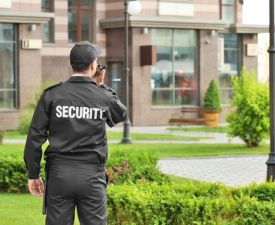Description
Course Name: Certificate in Safety & Security Management (Residential Societies)
Course Id: CSSMRS/Q0101.
Eligibility: 10+2 (Higher Secondary) or equivalent is required.
Objective: The detailed objective of this course is to provide a comprehensive understanding of best practices in residential safety and security management. Participants will gain practical knowledge in conducting thorough risk assessments, developing and implementing detailed emergency response plans, and managing security personnel and protocols.
Duration: Three Months.






Debit/Credit Card, Wallet, Paytm, Net Banking, UPI, or Google Pay.



• A soft copy (scanned) of your certificate via email within 7 days of examination.
• A hard copy (original with official seal and signature) sent to your address within 45 day of declaration of result.

Online Examination Detail:
Duration- 60 minutes.
No. of Questions- 30. (Multiple Choice Questions).
Maximum Marks- 100, Passing Marks- 40%.
There is no negative marking in this module.
| Marking System: | ||||||
| S.No. | No. of Questions | Marks Each Question | Total Marks | |||
| 1 | 10 | 5 | 50 | |||
| 2 | 5 | 4 | 20 | |||
| 3 | 5 | 3 | 15 | |||
| 4 | 5 | 2 | 10 | |||
| 5 | 5 | 1 | 5 | |||
| 30 | 100 | |||||
| How Students will be Graded: | ||||||
| S.No. | Marks | Grade | ||||
| 1 | 91-100 | O (Outstanding) | ||||
| 2 | 81-90 | A+ (Excellent) | ||||
| 3 | 71-80 | A (Very Good) | ||||
| 4 | 61-70 | B (Good) | ||||
| 5 | 51-60 | C (Average) | ||||
| 6 | 40-50 | P (Pass) | ||||
| 7 | 0-40 | F (Fail) | ||||







Syllabus:
Module 1: Foundations of Residential Security Introduction to residential security, Role of a security manager, Defining safety vs. security, Understanding threats and risks to a society, Roles and responsibilities of security personnel, Creating a security policy, Security audits and risk assessment, Communication protocols for security staff, Ethical considerations and professional conduct, Legal framework for residential security.
Module 2: Technology in Security Management CCTV systems and their effective use, Access control systems (biometric, keycard), Intercom and visitor management systems, Intrusion and fire alarm systems, Parking management technology, Integrated security management platforms, Data privacy and video surveillance laws, Cloud-based security solutions, Maintenance of security equipment, Use of patrol management software.
Module 3: Physical and Procedural Security Perimeter security (fencing, lighting), Gate and main entry point management, Visitor and vendor registration protocols, Vehicle and parking control, Patrolling techniques and schedules, Handling deliveries and courier services, Key and asset management, Emergency exits and secure areas, Staff background verification, Security of common amenities (pool, gym).
Module 4: Emergency and Disaster Management Fire safety systems and protocols, Creating a fire evacuation plan, Emergency response plan development, First aid and medical emergencies, Natural disaster preparedness (earthquake, flood), Bomb threat and terror attack response, Coordinating with local authorities, Role of security in a crisis, Conducting safety drills, Post-emergency recovery procedures.
Module 5: Legal and Ethical Considerations Understanding legal rights of security personnel, Use of force and self-defense laws, Data privacy and resident information, Handling evidence and incident reporting, Legal compliance for security equipment, Ethical dilemmas in security, Sexual harassment and inappropriate conduct, Understanding anti-social behavior laws, Cooperation with law enforcement, Legal rights of residents.
Module 6: Community Engagement and Communication Communicating security updates to residents, Handling complaints and conflicts, Building a positive relationship with the community, Security awareness programs for residents, Encouraging resident participation in safety, Training residents on emergency procedures, Managing social media and online forums, Handling media inquiries during an incident, Role of the security committee, Final project on a society security plan.
After completing the Certificate in Safety & Security Management (Residential Societies), you’ll be well-equipped to oversee and enhance security protocols in residential environments. Here’s a detailed look at the key roles, responsibilities, and salary expectations in India:
Career Roles & Salary Ranges
1. Security Supervisor (Residential Communities / Societies)
-
Role: Supervise security operations, coordinate guards, manage incident handling, enforce society safety protocols, and liaise with vendors or local law enforcement.
-
Salary:
-
Typically ranges from ₹1.3 LPA to ₹5.6 LPA, with top-paying organizations like CISF commanding ₹7.8–10 LPA.
-
City-wise expectations:
-
New Delhi, Mumbai, Bengaluru, Hyderabad: ₹1.5 LPA – ₹6–6.9 LPA
-
-
Facility management segment estimates:
-
₹1.5 – ₹4 LPA for 1–3 years of experience; up to ₹4 LPA with more experience.
-
-
2. Senior Security Supervisor / Lead
-
Role: Lead multiple security teams, strategize training & response protocols, and oversee higher-level operational tasks.
-
Salary:
-
Around ₹1.7 LPA to ₹7.5 LPA, with metro areas reaching up to ₹8 LPA.
-
3. Security Manager (Housing / Estate Level)
-
Role: Develop security systems, manage overall safety protocols, conduct audits, and ensure compliance across the property.
-
Salary:
-
Averages between ₹3.6 LPA – ₹32.5 LPA, depending on experience, location, and sector.
-
Metro-specific ranges:
-
Bengaluru: ₹4.2 – ₹40.6 LPA
-
Hyderabad: ₹4 – ₹34 LPA
-
Pune: ₹3.6 – ₹34 LPA
-
-
4. Regional Security Manager / Coordinator
-
Role: Oversee security operations across multiple society locations or commonly structured housing clusters, standardize procedures, and liaise with stakeholders.
-
Salary:
-
Ranges from ₹6 LPA – ₹41 LPA, depending on industry and region.
-
City-specific examples:
-
Lucknow: ₹13 – ₹30 LPA
-
Pune: ₹18 – ₹38 LPA
-
Bengaluru: ₹7.7 – ₹32 LPA
-
-
Career Progression Table
| Role | Salary Range (₹ LPA) |
|---|---|
| Security Supervisor | ₹1.3 – 5.6 (top: ₹7.8 – 10) |
| Senior Security Supervisor | ₹1.7 – 7.5 (metros up to ₹8) |
| Security Manager (Property Sector) | ₹3.6 – 32+ (metro upper: ₹40 LPA) |
| Regional Security Manager | ₹6 – 41 (top city roles) |
Field Perspective (Anecdotal Context)
In residential societies, security roles—including those like the watchman—are often modestly compensated, typically around ₹12,000–16,000 per month (₹1.4–1.9 LPA), especially in tier-1 and tier-3 cities. This reflects the frequently informal nature of the security labor market.
Final Thoughts
With your certificatе, you’re well-poised for impactful roles in security leadership within residential communities. Most professionals start as Security Supervisors (₹1–5 LPA) and can advance to Managerial or Regional roles capable of commanding ₹6–40+ LPA, especially in urban hubs.







Reviews
There are no reviews yet.